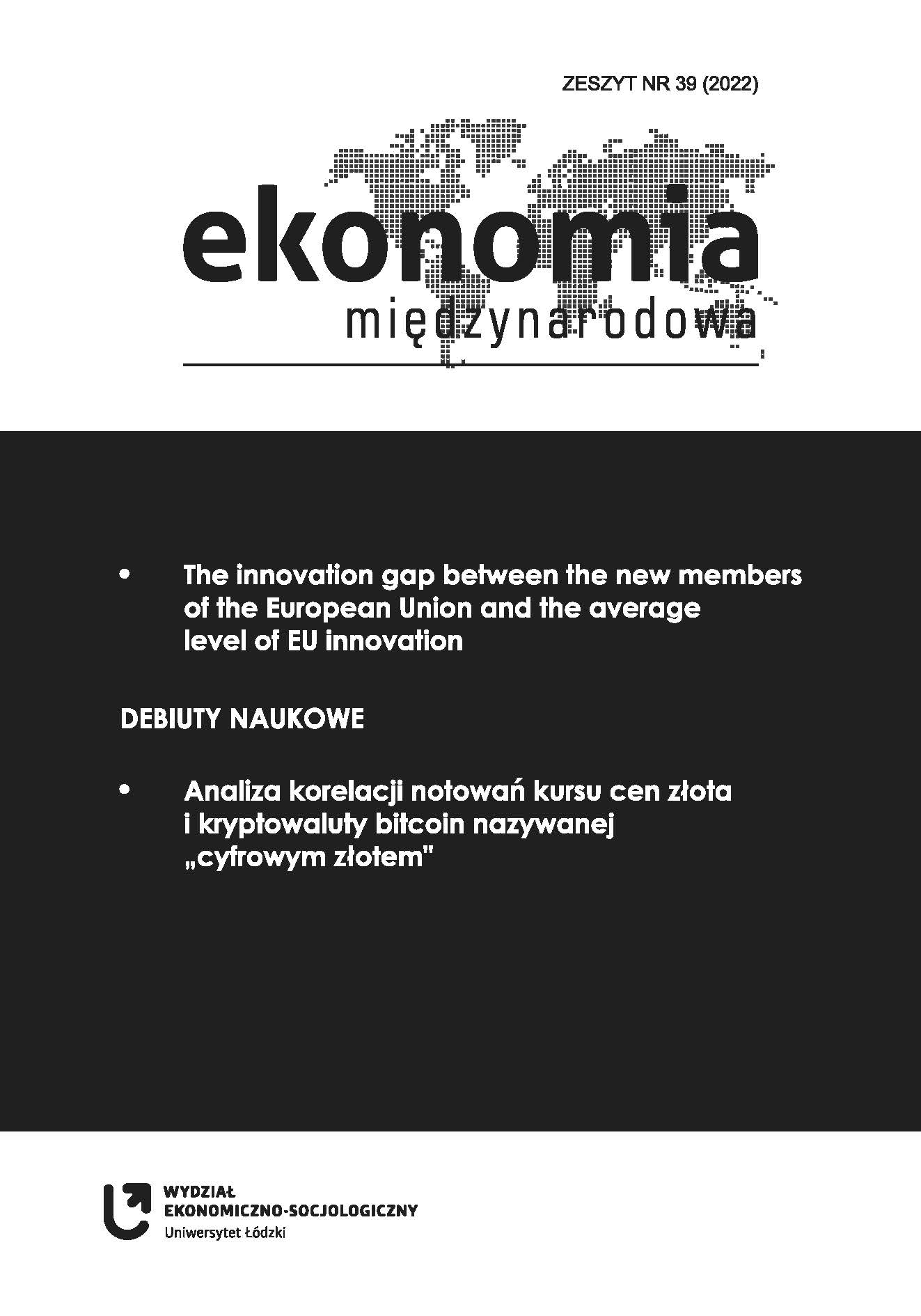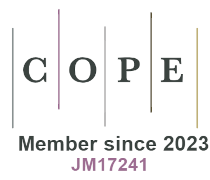The innovation gap between the new members of the European Union and the average level of EU innovation
DOI:
https://doi.org/10.18778/2082-4440.39.01Keywords:
innovation, innovation gap, European Innovation Scoreboard (EIS), Summary Innovation IndexAbstract
In the modern world innovation is considered as one of the most important factors determining the rate of economic growth and the level of economic prosperity. The factors determining its development are today research and development activity (R&D), innovative activity and human capital.
The aim of the paper is to assess the results of analysis aimed at estimating an innovation gap between new members of the European Union (Countries that joined the European Union in 2004 and later ) and the average level of innovation of the EU in the years 2004–2022. The paper is an introduction to further research including an analysis of the innovative capacity and innovative position of the surveyed countries, as well as an analysis of their innovative effectiveness with more in-depth exploration of the reasons for the convergence/divergence in innovation performance. The paper formulates the research thesis that assumes that the new member states of the EU did not catch up with an innovation gap in relation to the EU average in the years 2004–2022. The results of the analysis confirm this thesis for all countries except Estonia and Cyprus. The comparison is based on the Summary Innovation Index (SII), which was developed by the European Commission within the European Innovation Scoreboard (EIS). The paper reviewed the literature on the innovation gap. Descriptive analysis, statistical data analysis and comparative analysis methods were applied along with statistical data from the European Innovation Scoreboard in the period 2004–20022.
References
Annual Report 2021–2022 (2022), World Economic Forum, Geneva.
Google Scholar
Closing the EU`s innovation gap: Member states must get more involved (2022), European Court of Auditors, 15 June.
Google Scholar
Djellal F., Gallouj F. (2015), Innovation gap, performance gap and policy gap in the service economies, HAL Open Science, 6 February.
Google Scholar
European innovation performance continues to improve in spite of challenges, European Commisssion, Brussels, 22 September 2022, https://ec.europa.eu/commission/presscorner/detail/en/ip_22_5682 (access: 18 April 2023)
Google Scholar
European Innovation Scoreboard 2005, Comparative Analysis of Innovation Performance, European Commission, https://www.astrid-online.it/static/upload/protected/Euro/European-Innovation-Scorebord-12_01_.pdf (access: 23 December 2022)
Google Scholar
European Innovation Scoreboard 2007, Comparative Analysis of Innovation Performance, European Commission, http://aei.pitt.edu/46016/1/innovation_scoreboard_2007.pdf (access: 23 December 2022)
Google Scholar
European Innovation Scoreboard (EIS) 2009, European Commission, http://aei.pitt.edu/46018/1/innovation_scoreboard_2009.pdf (access: 23 December 2022)
Google Scholar
European Innovation Scoreboard 2011, European Commission, https://op.europa.eu/en/publication-detail/-/publication/705c770c-68f7-4f90-ac2b-618cc6cc8ed7 (access: 23 December 2022)
Google Scholar
European Innovation Scoreboard 2015, European Commission, https://op.europa.eu/en/publication-detail/-/publication/b00c3803-a940-11e5-b528-01aa75ed71a1 (access: 23 December 2022)
Google Scholar
European Innovation Scoreboard 2019, Methodology Report, European Commission, https://www.insme.org/the-european-innovation-scoreboard-2019/ (access: 23 December 2022)
Google Scholar
European Innovation Scoreboard 2019, European Commission, https://www.eustat.eus/elementos/ele0016800/european-innovation-scoreboard/inf0016823_c.pdf (access: 23 December 2022)
Google Scholar
European Innovation Scoreboard 2022, European Commisssion, https://research-and-innovation.ec.europa.eu/knowledge-publications-tools-and-data/publications/all-publications/european-innovation-scoreboard-2022_en (access: 23 December 2022)
Google Scholar
Growiec J. (2012), Zagregowana funkcja produkcji w ekonomii wzrostu gospodarczego i konwergencji, Oficyna Wydawnicza SGH, Warszawa.
Google Scholar
Kleer J. (2009), Gospodarka oparta na wiedzy a globalizacja: związki czasowe czy przyczynowe, [in:] GOW – wyzwanie dla Polski, Kotowicz-Jawor J. (ed.), PTE, VIII Kongres Ekonomistów Polskich, Warszawa.
Google Scholar
Kowalski A.M. (2020), Dynamics and Factors of Innovation Gap Between the European Union and China, “Journal of the Knowledge Economy”, No. 12.
Google Scholar
DOI: https://doi.org/10.1007/s13132-020-00699-1
Kraciuk J. (2006), Korporacje transnarodowe a zjawisko luki technologicznej w krajach rozwijających się, Zeszyty Naukowe Szkoły Głównej Gospodarstwa Wiejskiego, Vol. 61.
Google Scholar
Kubielas S. (2009), Innowacje i luka technologiczna w gospodarce globalnej opartej na wiedzy. Strukturalne i makroekonomiczne uwarunkowania, Uniwersytet Warszawski, Wydział Nauk Ekonomicznych, Warszawa.
Google Scholar
Mielcarek P. (2013), Luka innowacyjności polskiej gospodarki względem Unii Europejskiej, Zeszyty Naukowe Uniwersytetu Szczecińskiego Nr 756, „Finanse, Rynki Finansowe, Ubezpieczenia”, nr 57.
Google Scholar
Pawlik A. (2014), Dystans innowacyjny województw, Wydawnictwo Uniwersytetu Jana Kochanowskiego, Kielce.
Google Scholar
The Global Competitiveness Report. Special Edition 2020, Schwab K. (ed.), World Economic Forum, Geneva.
Google Scholar
Theme Report on Innovation, Technologies and Data. Towards the achievement of SDG 7 and net-zero emissions (2021), United Nations, New York, September.
Google Scholar
These are the top 5 most innovative countries in the European Union, World Economic Forum, European Union, 19 October 2022, https://www.weforum.org/agenda/2022/10/european-union-top-innovative-countries (access: 18 April 2023)
Google Scholar
Weresa M.A. (2014), Polityka innowacyjna, Wydawnictwo Naukowe PWN SA, Warszawa.
Google Scholar
Zacher L. (2007), Transformacje społeczeństw od informacji do wiedzy, C.H. Beck, Warszawa.
Google Scholar
Downloads
Published
Versions
- 2023-07-18 (2)
- 2023-06-30 (1)
How to Cite
Issue
Section
License

This work is licensed under a Creative Commons Attribution-NonCommercial-NoDerivatives 4.0 International License.









